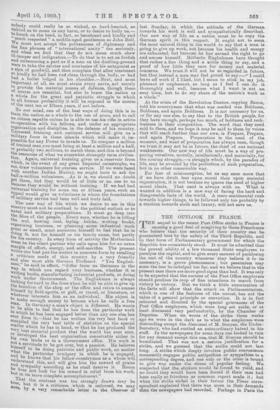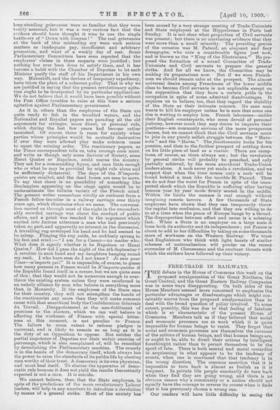THE OUTLOOK IN FRANCE. T HE sequel to the recent Post
Office strike in France is causing a good deal of misgiving to those Frenchmen who believe that the security of their country can be guaranteed best by the safety of the Third Republic, and. by that form of Parliamentary government for which the Republic has consistently stood. It must be admitted that the proved ability of a few thousand State employees to paralyse the capital, and to give every earnest of paralysing the rest of the country whenever they believe it to be necessary, is a grave phenomenon ; but pessimism may none the less be indulged too far, and we believe that in the present case there are more good signs than bad. It was only to be expected that the success of the Post Office employees should. produce its crop of fine intentions to march from victory to victory. But we think a little examination of the facts will show that the attack on Parliamentarism, which is one of the features of the unrest, has not the value of a general principle or conviction. It is in fact coloured and directed by the special grievancee of the Post Office employees, -which were long set aside, or at least. discussed very perfunctorily, by the Chamber of Deputies. When we wrote of the strike three weeks ago we were in the dark as to what the employees were demanding except the dismissal of M. Siinyan, the Under- Secretary, who had excited an extraordinary hatred in his staff. In the newspapers for some days one looked in vain for any demand except this one, that M. Simyan should be humiliated. That was not a serious justification for a strike, and. we guessed that the strike could not . last long. A strike which deeply involves public convenience necessarily engages public antipathies or sympathies to a corresponding degree, and one side or the other is bound to give way under the stress of popular feeling. We suspected that the strikers would be forced to yield, and no doubt they would have been forced if their ease had. been really so frivolous as common report made it ; but when the strike ended in their favour the Tones corre- spondent explained that there was more in their demands than the newspapers had recorded. Perhaps in Paris the long-standing grievances were so familiar that they were tacitly assumed, but it was a very curious fact that the strikers should have thought it wise to use the single battle-cry of "Down with Simyan !" The real grievances at the back of this misleading cry were such serious matters as inadequate pay, insufficient and arbitrary promotion, and want of a weekly day of rest. Some Parliamentary Committees have even reported that the employees' claims in these respects were justified ; but nothing has ever been done to satisfy them, and it has become a habit with the Chamber of Deputies to let each Minister pacify the staff of his Department in his own way. Makeshift, and the devices of temporary expediency, have taken the place of a coherent policy. That is why we are justified in saying that the present revolutionary agita- tion ought to be interpreted by its particular applications. We do not believe that it would have been possible without the Post Office troubles to raise at this time a serious agitation against Parliamentary government.
As it is, others than the employees of the State are quite ready to fish in the troubled waters, and the Nationalist and Royalist papers are parading all the old arguments for stronger, more direct, or personal rule, which during the last few years had become rather tarnished. Of course there is room for anxiety when parties whose principles would be mutually destructive if over they were allowed play make common cause to upset the existing order. The reactionary papers, as the Times correspondent tells us, take courage once more, and write as though only some Saviour of Society, some Henri Quatre or Napoleon, could rescue the country. They ask for a commanding figure, and care little enough who or what he may be provided he might rule alone and be sufficiently dictatorial. The days of the lrimporte- guistes are recalled, and the dead bones are seen to move. To say that there is no possibility of something like Boulangisin appearing on the stage again would be to underestimate the infinite variety of the French mind. The present writer remembers vividly an outburst from a French fellow-traveller in a railway carriage over thirty years ago, which illustrates what we mean. The conversa- tion carried on through most of the night in the uncomfort- ably crowded carriage was about the conduct of public affairs, and a point was reached in the argument which excited into furious utterance a man who had previously taken no part, and apparently no interest, in the discussion. A travelling rug enveloped his head and he had seemed to be asleep. Flinging the rug aside, he suddenly sprang to his feet and cried I am for a Caesar—no matter who. What does it signify whether it be Napoleon or Henri Quatro ? How did I pass the night of the 4th September ? A revolver in each hand and my daughters hanging round my neck. I who have seen do I not know ? Je suis pour Cesar--n'importe qui!" It is impossible, of course, to guess how many persons in France would be N'imporie-quistes if the Republic found itself in a corner, but we are quite sure of this : that they would not be numerous enough to over- throw the existing system unless they were reinforced in an unholy alliance by men who believe in everything more than in Monarchy. lithe employees of the State care for their country, they will not strengthen the hands of the reactionaries any more than they will make common cause with that anarchical body the Confkleration GiSnerale du Travail. Disappointment at the non-fulfilment of promises to the electors, which we can well believe is affecting the workmen of France with special bitter- ness at this moment, is not peculiar to France. The failure to some extent to redeem pledges is universal, and is likely to remain so as long as it is the duty of an Opposition to oppose. But neither the partial impotence of Deputies nor their unfair exercise of patronage, which is also complained of, will be remedied by demolishing the Parliamentary machine. The remedy is in the hands of the democracy itself, which always has the power to raise the standards of its public life by electing men worthy of their trust. A democracy is its own physician, and must heal itself. To shatter the apparatus of demo- cratic rule because it does not yield the results theoretically expected is not a cure. It is suicide.
We cannot believe, then, that the State employees, in spite of the predictions of the more revolutionary Labour leaders, will help in any numbers to introduce a revolution by means of a general strike. Most of the anxiety lute been caused by a very strange meeting of Trade-Unionists and State employees at the Hippodrome in Paris last Sunday. It is not clear what proportion of Civil servants was present ; but there is no convincing evidence that they were more than a small minority. The presiding genius of the occasion was M. Pataud, an eloquent and fiery demagogue, who cuts a considerable figure just now, and is known as the "King of the Electricians." He pro- posed the formation of a mixed Committee of Trade- Unionists and Civil servants to prepare the general strike. And for all we know, the Committee may be making its preparations now. But if we were French- men we should remain calm at the prospect. The almost universal desire among Frenchmen of the lower middle class to become Civil servants is not explicable except on the supposition that they have a certain pride in the occupation in spite of some admitted disadvantages. It requires us to believe, too, that they regard the stability of the State as their intimate concern. No sane man wants to kill his employer unless he is sure that some one else is waiting to employ him. French labourers—unlike their English counterparts, who seem devoid of personal jealousy, however much they may desire to improve their positions—are commonly envious of the more prosperous classes, but we cannot think that the Civil servants mean to join in any purely selfish struggle between the " Have- nets " and the "Haves." The foncitionnaira looks for his pension, and then to the further prospect of settling down on his little piece of land as a rentier. There are excep- tions, of course, as there always are ; but the revolution by general strike will probably be preached, and only partially achieved, by the more anarchical Trade-Union leaders alone. A mob never yet made a revolution, and we suspect that when the time comes only a mob will be found behind a man like the terrible M. Pataud. Thus we do not fear the worst for France in spite of the unex- pected shock which the Republic is suffering after having become year by year more firmly seated in the saddle. Within its limits the menace is real enough without imagining remote terrors. A few thousands of State employees have shown that they can temporarily throw the capital into confusion, and that they are willing to do so at a time when the peace of Europe hangs by a thread. The disproportion between effect and cause is a sobering fact. When a State is an employer on a large scale it loses both its authority and its independence ; yet France is about to add to her difficulties by taking on some thousands more of workmen on the Western Railway. We trust that Englishmen who think with light hearts of similar schemes of nationalisation will ponder on the recent surrender of M. Clemenceau and the exultant threats with which the strikers have followed up their victory.







































 Previous page
Previous page